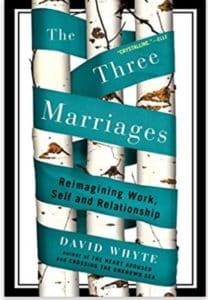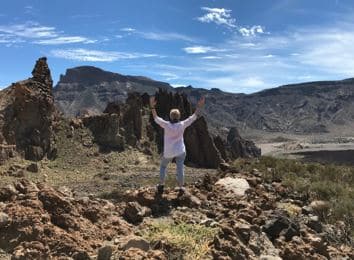Clare Cable discusses “The Three Marriages” by David Whyte.
 We cannot be fully present to ourselves, our relationships and our work all the time. It is not humanly possible. …. well that’s a relief!
We cannot be fully present to ourselves, our relationships and our work all the time. It is not humanly possible. …. well that’s a relief!
I have just finished reading David Whyte’s book ‘The Three Marriages’ as I have been challenged over the last year about the amount of bandwidth which I give to work as opposed to the rest of my life. But this image of ‘work-life balance’ – apportioning pieces of pie to different bits of my world – has not felt comfortable and I was looking for another model, one which recognises how much I love what I do at work and the energy that brings to the rest of my doing and being.
Back in June, Jane Cantrell, Pat Tyrrell (QNIS Trustees) and l went to spend three days with the U Lab Scotland hub hosts. It was a fabulous gathering of extraordinary change makers from across Scotland and the wider world. In the course of conversation I was describing my work life imbalance and one of the other participants, from Canada, asked if I’d read David Whyte’s book ‘The Three Marriages’. It will not surprise you to learn that it has taken me until October to actually read the book, which required me to stop – a holiday! So I am writing this blog, to record what I am thinking and learning, from a palm-shaded patio overlooking the Atlantic (highly recommended!).

David Whyte’s thesis is that we are all engaged in three marriages: with another (in an actual marriage or in relationship with significant others); with work (which will be defined differently though our lives), and; with ourselves. Rather than seeing these three as in competition for space in our lives, we need to recognise they are intertwined and interdependent. Now, I am aware of the echo chamber effect, where I am prone to read and believe things that support my existing beliefs (or prejudices), and David Whyte is absolutely not saying it’s OK to spend your life at work. However, reframing the relationship between all three as the focus, is incredibly helpful. So I have tried to capture in this blog the things that I have taken from the book.
At the heart of the three marriages is me. Our life’s work is to get to know, to understand and to have compassion for our true selves. Bizarre yet true, this ‘true self’ seems to have conflicting core competencies, of knowing what is nourishing and best for us, whilst also being skilled in sabotaging the very same. I completely recognise that self-sabotage; but why do we do that? It is utterly counterproductive. Perhaps this is the subject of an altogether more philosophical blog. Suffice to say for today, I absolutely know it to be true!
At one level getting to know ourselves sounds rather self-indulgent (and also a bit scary), yet it seems to be critical to our wellbeing across all three areas. The only way to get to know ourselves is to create space and silence, which is the wisdom of all the world’s spiritual traditions, and yet we struggle to find the time. Each week I say I will get up earlier to be silent, some days I create that space in the office when I’m in before colleagues, other days at home in the evening, but so often stuff gets in the way and silence ceases to be the priority. The book suggests that at the heart of our reluctance to be still, is an anxiety about what we may find.
Even when I do manage to be still, the daily ‘to do’ list becomes a mantra that fills the space in my head. We cannot bring our usual organisational skills to bear on being still; it doesn’t work like that. There is no ‘five things done consistently will produce this result’ like in our approach to patient safety, no formula, no competency framework … I find that very frustrating. Sometimes my mind can be still(ish) and other times all over the place and there’s no rhyme or reason to it.
Over time, we learn to observe what is going on in our heads, watching our thoughts come and go and with daily practice space opens up; the ‘to do’ lists subside, the rehearsed conversations diminish and we can allow them to drift away. I know that I am an absolute beginner in this journey!
As we create the space, our awareness grows, not only of our self-sabotaging tendencies, but also of our virtues; something else we often find hard to contemplate. We also become aware of our fears and anxieties and only when we do so, says David Whyte, do we have room for the anxieties of others. We can welcome others into our lives because no matter what their fears are they do not make us afraid. I wonder how often I close down conversations because I do not have the space to really hear someone else’s heartfelt worry.
It may seem safer to stay ‘on the surface’ but self-compassion and therefore compassion for others depends on our inner seeing. Our anxieties and our need to control those we love, and our work, prevent us from that inner seeing. Reading this challenged me; do I really try to control those I love and my work? I can clearly see the faces of family and colleagues with that ‘duh, of course’ look!?!
Our refusal to be still also stops us marveling at the natural world, appreciating those around us and creating the space we need to grow. I have so enjoyed having that opportunity on holiday; climbing mountains, watching the stars, listening to the ocean. Making that space on the walk to work is trickier, yet possible.

David Whyte suggests that our happiness in the other two marriages – with another/others and work, is dependent on having a contented, compassionate relationship with self.
So where does that leave my conversation about time spent at work? It takes me to a different place. It’s not about hours but about listening, about stillness and the courage to look at what I am avoiding or sabotaging in the choices I make. As I sit on my Atlantic balcony gazing over palm trees to a vast expanse of ocean, silence and contemplation comes naturally.
I cannot be fully present to myself, my relationships and my work 100% of the time, but in trying to make more space to be silent I can increase that time. Ask me again next week when I am in the midst of my overloaded diary – are you creating space for stillness? … and I hope my answer will be yes!
Clare Cable
Chief Executive and Nurse Director
QNIS